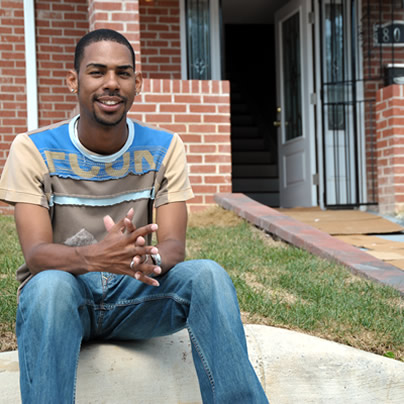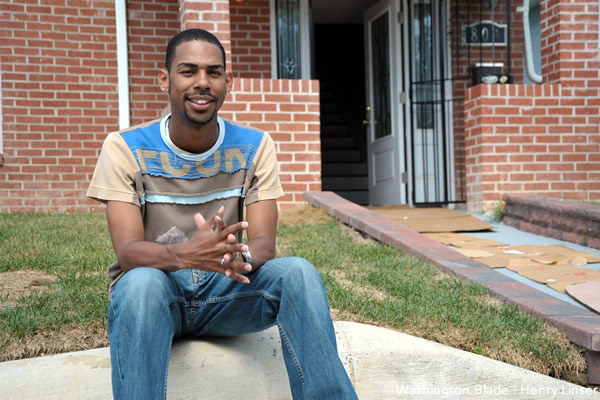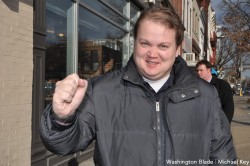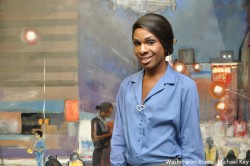Arts & Entertainment
A place to call home
Wanda Alston House for LGBT youth to launch foundation


Brian Watson at the Wanda Alston House. (Washington Blade file photo by Henry Linser)
The Wanda Alston House has helped support homeless LGBT youth throughout the last five years. Now, with Transgender Health Empowerment’s (THE) bankruptcy, the Alston House needs some support of its own.
The Wanda Alston Foundation formed in July to financially aid the Alston House in the wake of THE’s collapse. The foundation hosts its official launch reception and first fundraiser at MOVA Lounge (2204 14th St., N.W.) Tuesday from 5:30-8 p.m. The kick-off reception also celebrates the Alston House’s fifth year anniversary.

Christopher Dyer (Washington Blade photo by Michael Key)
“It’s a unique program and we’d love to have as much support as we can from the community about this,” says Christopher Dyer, president of the Wanda Alston Foundation. “We’re getting grants, we’re up and running and we’d love to have as much support, in terms of volunteers and financially, as we possibly can.”
At the Alston House’s inception, the Department of Health and Human Services provided funding for the shelter combined with help from THE’s services to aid homeless LGBT youth. After THE’s bankruptcy, Alston House needed additional funding. Former THE Director of Programming Brian Watson oversees the Alston House and sought funding through a sponsor. The foundation was formed to administer the grants needed to keep the program running as well as the program itself.
“It’s a good foundation to start because it’s sourcing money more directly to Wanda Alston. There was some fundraising effort but it’s complicated to describe fundraising to donors. Now the foundation is pretty clear,” Dyer says.
Alston House, named after Wanda Alston, a lesbian activist who was murdered in Washington in 2006, is a renovated multi-bedroom house located in the Deanwood neighborhood of Northeast’s seventh Ward. It opened after THE noticed an increase of LGBT youth at its drop-in center. The house has assisted about 50 people ages 16-24 over the last five years. Eight people now reside in the home, the maximum amount allowed at one time. It is the only program designed to provide services for homeless at-risk LGBT youth in the District.
The house is always full excluding when rooms are being cleaned for new residents. Residents are required to go to school or have a job while staying in the house. They are allowed to stay up to 18 months. Former residents have gone on to attend college, move into their own places or returned home to their families. The board’s secretary, Xion Lopez, is a former Wanda Alston House resident. She lived there for about 13 months from the end of 2011 until January of this year. She joined the board last month after being told it would be advantageous to have the perspective of a former resident and transgender person on the board.

Xion Lopez (Washington Blade photo by Michael Key)
“This is a service that is definitely needed,” Lopez, 22, says. “Homelessness continues to grow and these are our children out there suffering through this. They’re forced into all kinds of things from drugs to prostitution to even jail, just to survive. Some don’t mind going to jail because they see that as a safety net. But we’re here to help. Do what you need to do to get on the waiting list. That’s what we’re here for.”
A paid staff that includes a full-time executive director, program director and administrator coordinator controls the day-to-day activities. The house also has trained adult supervisors qualified to oversee the special needs of a homeless shelter. The board approves each staff member hired.
The board focuses primarily on the fiscal and government oversight of the organization. The nine members work together to determine policies such as which grants are important and feasible to apply for and which are not. Approximately 90 percent of their revenue comes from D.C. administrated grants.
Lopez says she had an overall great experience at the Alston House. Among her fellow residents, several have moved on to school, one is studying abroad, two others are out on their own with full-time jobs, another got married and had a child.
“We have lots of success stories,” she says.
Now living on her own in Hyattsville, Md., Lopez says there were occasionally tensions within the house, but a high emphasis was placed on working through tension.
“You put eight LGBT young people in a house together, of course it’s not going to be all rainbows everyday,” she says. “There were some hormones and attitudes that collided but for the most part we had good relationships with each other and things that needed to be worked out were brought to the forefront. We never closed out a week with things not being addressed.”
Funding from the city has been steady over the years. The organization’s budget is about $400,000 per year. It includes the $60,000 spent on renting the house per year. The fundraising efforts have just begun and start with the reception on Tuesday. Dyer admits that the board is still figuring out how to organize “an infrastructure for donor maintenance.”
Dyer’s support for Alston House and his collaboration with Watson began five years ago when he worked as an LGBT liaison for former D.C. Mayor Adrian Fenty. Watson secured funding for the Alston House from the D.C. City Council while Dyer served under Fenty’s administration in 2007. He became president of the Wanda Alston House Foundation board during the foundation’s first meeting in August.
The board has already made strides as an organization as they recently moved their operation from inside the Alston House to an administrative office downtown. Eventually, the board would like to expand the program so more clients can find help.
“We’re so new our board is much more active as opposed to a board that meets once every two or three months and just writes checks,” Dyer says. “We’re more intimately involved in the strategic direction of the organization.”

Friday, July 11
“Center Aging Friday tea Time” will be at 2 p.m. in person at the DC Center for the LGBT Community’s new location at 1827 Wiltberger St., N.W. This is a social hour for older LGBTQ+ adults. Guests are encouraged to bring a beverage of choice. For more details, email [email protected].
Women in Their Twenties and Thirties will be at 8 p.m. on Zoom. This is a social discussion group for queer women in the Washington, D.C. area and a great way to make new friends and meet other queer women in a fun and friendly setting. For more details, visit the DC Center’s website.
Go Gay DC will host “LGBTQ+ Happy Hour” at 7 p.m. at Firefly. This event is ideal for making new friends, professional networking, idea-sharing, and community building. This event is free and more details are available on Eventbrite.
Saturday, July 12
Go Gay DC will host “Family Fun Story Time” at 12 p.m. at Freddie’s Beach Bar & Restaurant. Join award-winning drag queen Tara Hoot for songs, stories, bubbles, puppets and dancing. It’s the feel-good event you didn’t know you needed. This event is perfect for kids and kids at heart. Attendance is free and more details are available on Eventbrite.
Miss Capital Pride will host “DC Drag brunch on Rooftop – Penthouse” at 12 p.m. at MXDC Cocina Mexicana. Guests will experience a Mexican brunch infused with Baby Shank’s signature dishes, complemented by delicious margaritas and mimosas, all within the beautiful and spacious atmosphere of MXDC. There will also be outstanding performances by glamorous drag queens and celebrated celebrity impersonators, featuring Taylor Swift, Lady Gaga, Beyoncé, Britney Spears, Nicki Minaj, Ariana Grande, Whitney Houston, Cher, and many more. Tickets cost $30.65 and are available on Eventbrite.
Sunday, July 13
The National Portrait Gallery will host “Stormé at Stonewall” at 1:30 p.m. This is a gallery talk with LJ Roberts and Charlotte Ickes. This exhibition is a light-box portrait of activist Stormé DeLarverie, who is said to have thrown the first brick at Stonewall—the uprising credited with launching the modern LGBTQ+ rights movement in 1969. Roberts created this unconventional portrait in response to DeLarverie’s absence in mainstream narratives about the history of the Stonewall rebellion. Attendance is free and more details are available on Eventbrite.
Monday, July 14
“Center Aging Monday Coffee Klatch” will be at 10 a.m. on Zoom. This is a social hour for older LGBTQ+ adults. Guests are encouraged to bring a beverage of choice. For more details, email [email protected].
Genderqueer DC will be at 7 p.m. in person at the DC Center for the LGBT Community. This is a support group for people who identify outside of the gender binary, whether you’re bigender, agender, genderfluid, or just know that you’re not 100% cis. For more details, visit genderqueerdc.org or Facebook.
Tuesday, July 15
Center Bi+ Roundtable will be at 7 p.m. on Zoom. This is an opportunity for people to gather in order to discuss issues related to bisexuality or as bi individuals in a private setting.Visit Facebook or Meetup for more information.
Wednesday, July 16
Job Club will be at 6 p.m. on Zoom. This is a weekly job support program to help job entrants and seekers, including the long-term unemployed, improve self-confidence, motivation, resilience and productivity for effective job searches and networking — allowing participants to move away from being merely “applicants” toward being “candidates.” For more information, email [email protected] or visit thedccenter.org/careers.
Thursday, July 17
The DC Center’s Fresh Produce Program will be held all day at the DC Center for the LGBT Community. People will be informed on Wednesday at 5 p.m. if they are picked to receive a produce box. No proof of residency or income is required. For more information, email [email protected] or call 202-682-2245.
Virtual Yoga with Charles M. will be at 7 p.m. on Zoom. This is a free weekly class focusing on yoga, breath work, and meditation. For more details, visit the DC Center for the LGBT Community’s website.
Lit Lovers: Book Club for Seniors will be at 2 p.m. on Zoom. The book selection for July is “Rubyfruit Jungle” by Rita Mae Brown. For more details, visit the DC Center’s website.
Poly Discussion Group will be at 7 p.m. on Zoom. This is an inclusive, welcoming, virtual safer space to talk about all things polyamorous — the rapturous, the confused, the pure YIKES, we want to hear them all. For more details, email [email protected].
Television
ICYMI: ‘Overcompensating’ a surprisingly sweet queer treat
A sweet, savvy show about breaking free to embrace your true self

Pride month 2025 is now behind us, and while it’s safe to say that this year’s celebrations had a darker edge than usual, it’s also true that they came with a particularly rich bounty of new queer movies and shows to entertain us – so many, in fact, that even if we are facing a lull until the fall another harvest of fresh content, there are still plenty of titles – which, for whatever reason, were off your radar – for you to catch up on in the meantime.
One of the most notable of these – the bingeworthy series “Overcompensating” (now streaming on Amazon Prime) – will most definitely have been ON the radar for the plentiful fans of creator and star Benito Skinner, the actor/comedian who rose to viral fame through his content on platforms like Instagram, YouTube, and TikTok. For anyone else, it might have easily slipped through the cracks.
Created and written by Skinner as a loosely autobiographical “college comedy,” it aims for the kind of raucous, explicitly sexed-up tone one expects from the genre as it centers on Benny (Skinner), newly arrived as a freshman at prestigious Yates University. A former football jock and “golden boy” at his midwestern high school, he’s the picture of idealized youthful masculinity; he’s also deep in the closet, struggling to keep his sexuality hidden and maintain his macho front under the intense scrutiny of the college’s social scene – and under the resentful eye of his older sister Grace (Mary Beth Barone), who has already secured her own place at the top of the pecking order.
In the first episode, Benny’s difficulties are eased when he meets Carmen (Wally Baram), another freshman trying to navigate the politics of college life; a gamer from a home marred by tragedy, she’s an outsider who feels like she’s putting on an act, too, and they click – giving him the convenient “cover” of female companionship while providing them both with much-needed support and encouragement. He’s also befriended by a handsome film major from England (Rish Shah), who has already caught his eye, stirring other kinds of feelings and possibly even reciprocating them. Meanwhile, he’s being courted by the school’s “exclusive secret society” – headed by his sister’s aggressively “alpha” boyfriend Pete (Adam DiMarco) – and trying to stay interested in his studies, despite a growing realization that a career in business doesn’t actually appeal to him all that much.
That’s a lot to juggle for anybody, even an overachiever like Benny – whose “lucky” life so far has largely been the result of playing a role he is finding harder and harder to maintain. As the series goes on through its eight-episode arc, it becomes clear that he’s not the only one who is “keeping up appearances,” and he, along with the other confused and damaged young people in his orbit, begins the painful (but often hilarious) process of evolution that is required in order to become truly oneself.
Directed toward appealing to a younger demographic, “Overcompensating” is the kind of show that requires a few episodes worth of invested time to make an impression that feels like substance. Full of the bawdy farcical antics that go hand in hand with stories about hormonally charged college kids, it’s not above leaning into the formulas and tropes that have always driven these kinds of comedies. At first, while its broadly comedic strokes and frequently explicit sexual hijinks might elicit plenty of chuckles, the show might easily feel tiresome for more mature audiences; there’s a nostalgic fun to it, made even more appealing, somehow, by the “political incorrectness” of its frequently sexist and homophobic humor, but for a while things may feel like an unnecessary attempt to reinvent “Animal House” for the Gen Z crowd.
By the time the season reaches its halfway point, however, things have started to get real. The antics of these horny almost-adults take on a more pointed absurdity, informed by the increasingly tangled web of defensive deceit they weave among themselves – and, as things draw toward a cliffhanger climax, the consequences of maintaining it – until it achieves a sense of empathy toward them all. There’s a wisdom that smacks of lived authenticity underlying the whole affair, transforming it from the “sexploitative” teen comedy of its surface into something deeper. To be sure, things stay expectedly wacky, and the soap-operatic melodrama of its twists and reversals continue to maintain the show’s “mature YA” appeal; but beneath those trappings, by the end of the season a truer identity has begun to emerge, just as its characters have begun to find their own levels of self-actualization for themselves.
As creator, primary writer, and star, it’s obviously Skinner who deserves much of the credit. While it might be tempting, early on, to dismiss the show as an “ego project,” the internet-spawned sensation proves his talents quickly enough to get past such judgy suspicions, delivering a pitch-perfect blend of sauciness and sensitivity that extends its appeal toward both ends of the taste spectrum; just as crucially, he brings the same aforementioned “lived authenticity” to his winning performance – after all, he’s essentially playing himself in a fictionalized version of his own life – while also making sure that equal time (and compassion) is afforded all the other characters around him, each of whom are pushing at the boundaries of their own respective “closets,” too. It’s unavoidable to notice that – like most of his co-stars – he’s plainly a decade too old to be playing a college student; but by the time we reach that crucial halfway turning point, we’ve become too engaged by him to care.
The show is full of excellent performances, in fact. Relative newcomers Baram and Barone offer layers of complex nuance, while the more familiar DiMarco (“White Lotus”) is close to heartbreaking as the toxic BMOC clinging to the illusion of power as his life begins unraveling around him. Other standouts include the mononymic actress Holmes as Carmen’s “wild child” roommate, solidly likable turns as Benny’s parents from mature veterans Connie Britten and Kyle MacLachlan (whose presence, along with stylish elements in several key scenes, hints at an homage-ish nod to the late David Lynch), and podcaster Owen Thiele as an openly gay fellow student who has Benny “clocked” from the moment they meet. Finally, Lukas Gage makes a deep impression as a former high school teammate at the heart of Benny’s most haunting memory.
There’s no official word yet on whether “Overcompensating” will be renewed for a second season, despite the multiple loose ends left dangling at the end of its first; it has proven to be popular, and Skinner’s large fanbase makes it likely that the story will continue. Even if it doesn’t, the place of uncertainty in which it has left its characters rings true enough to serve as a satisfying endpoint.
As for us, we hope that won’t happen. For all its sophomoric humor, generic plot twists, and purposefully gratuitous sexual titillation, it’s one of the sweetest, kindest, and most savvy shows we’ve seen about breaking free from conformity to embrace your true self – and that’s a message that applies whether you’re queer, straight, or anywhere in between.
Photos
PHOTOS: Independence Day Weekend in Rehoboth
Wicked Green Pool Party, fireworks among festivities

Vacationers and residents alike enjoyed Independence Day Weekend activities in Rehoboth Beach, Del. The Wicked Green Pool Party drew hundreds to the CAMP Rehoboth fundraiser on Saturday. That evening, revelers went to the rooftops to watch the fireworks display.
(Washington Blade photos by Daniel Truitt)













-

 Federal Government2 days ago
Federal Government2 days agoTreasury Department has a gay secretary but LGBTQ staff are under siege
-

 Virginia3 days ago
Virginia3 days agoDefying trends, new LGBTQ center opens in rural Winchester, Va.
-

 District of Columbia2 days ago
District of Columbia2 days agoGay GOP group hosts Ernst, 3 House members — all of whom oppose Equality Act
-

 District of Columbia2 days ago
District of Columbia2 days agoD.C. police seek public’s help in July 5 murder of trans woman









